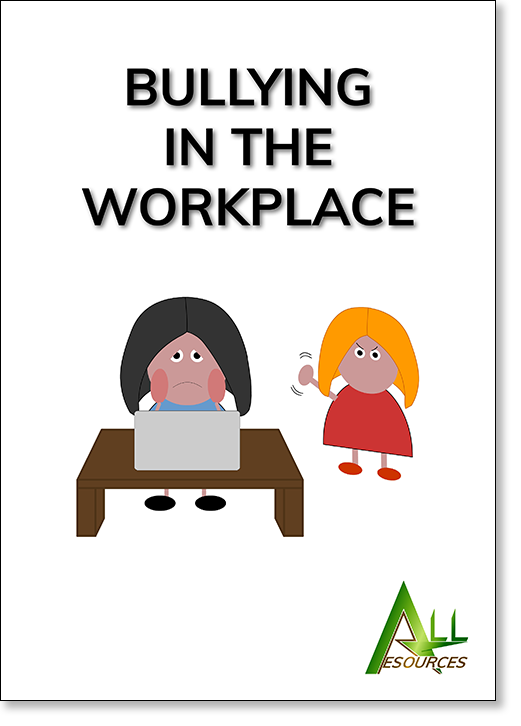Workplace Bullying

Bullying in the Workplace
This pack provides guidance for companies on tackling workplace bullying, supporting the targets of bullying and ensuring the wellbeing of staff.
- Focus: Anti-bullying policies for businesses
- Category: Businesses
- Last revised: 2022
- Pages: 50
- Illustrated throughout
Hard copy: £25.99 add to basket
![[Template thumbnail] Workplace Anti-Bullying Policy](https://www.allresources.co.uk/images/free-resources/workplace-anti-bullying-policy-template-cover.png)
Workplace Anti-Bullying Policy
(free template)
A free template to help you develop your own anti-bullying policy for your workplace.
When we think of bullying, most of us think about school bullying. However, it is a sad fact that bullying also occurs in the workplace. In fact, workplace bullying is an increasing problem which is made worse when companies fail to tackle the issue. As with all cases of bullying behaviour, when we examine bullying at work we are referring to repeated inappropriate behaviour which takes place over a period of time. The sole aim of this type of conduct is to undermine an individual’s right to respect and dignity at work. When someone is bullied in the workplace, they often suffer from high levels of stress, anxiety and depression.
There are also other factors to consider when someone is bullied at work such as the decrease in work performance as well as an increase in absenteeism on the part of the bullied person. It is therefore vital that any reports of bullying are dealt with swiftly. The HR department is usually responsible for dealing with bullying and the first step is to speak to the target and the suspected workplace bully. When HR has heard both sides of the matter they can carry out a thorough investigation before taking further action as necessary.
Signs of Workplace Bullying
Bullying in the workplace is often subtle in nature and it can be difficult to spot when compared to regular bullying. Examples of workplace bullying include:
- Regular and unwarranted criticism of a person’s quality/quantity of work.
- An overly-aggressive manner, particularly by a director, manager or supervisor.
- Personal insults and name calling, verbal abuse and derogatory comments.
- Gossiping about a member of staff, starting rumours, ridiculing a person behind their back.
- Persistently overlooking someone for training, advancement, promotion etc even when it is clear they are the best candidate.
- Unfairly delegating large amounts of work to a specific person, often resulting in them working late, encroaching on their personal time.
Types of Workplace Bullying
Some of the most common types of bullying in the workplace include:
- Spreading spiteful rumours specifically to damage someone’s reputation.
- Verbal abuse, mainly on the ground of race, sex, disability, sexual orientation, religion etc.
- Exclusion or victimisation — excluding someone from team events, meetings etc.
- Ridiculing or demeaning someone — setting someone up to fail.
- Micro-managing every part of a subordinates work.
- Threats or comments about job security without foundation.
- Blocking promotion or training opportunities.
- Making derogatory comments online.
It is evident that bullying has a detrimental impact on mental health. It is not enough simply to have HR policies and anti-bullying strategies in place. These policies must be rigorously applied and staff must be able to engage around these issues.


